Answering Your Concerns About Messy Play

One of my favorite parts of my job is sharing my products at fairs where I can talk about my enthusiasm for messy play with new people. It's so much fun! It's also eye-opening, as I often hear the concerns they have about introducing their kids to messy play. I wanted to take a moment today to answer a few of the most common ones I've encountered.
What are the disadvantages of messy play?
Even the simplest messy play activities require time and attention, which as a parent myself, I understand can both be precious resources. If your family is strapped for time, try integrating messy play into your daily activities. Bath and shower time can be a blast with a few toys or bath crayons. Daily walks to the bus stop or rides in the car can include conversations about what your little one sees or smells. Eating together can be a great way to try new textures and taste diverse flavors.
Everyone’s everyday life is filled with sensory activities already, so try to be a little more intentional about recognizing and communicating them. Other disadvantages may be that your toddler doesn’t like messy play, that it’s well…messy, and that activities can be expensive. But there are great tips to contain messes and keep messy play activities in your budget as shared below.
What if my toddler doesn't like messy play or messy hands?
Often simple modifications can be made to messy play activities so your toddler can enjoy them. Think about what you already know about your child’s preferences. Maybe your toddler doesn’t like messy hands. If they don't like touching certain textures with their hands, consider incorporating kitchen or sand tools like a measuring cup or sand shovel. That way they can still manipulate the materials without becoming uncomfortable. Be encouraging and open-minded as they explore this new adventure!
What if messy play is TOO messy?
This is a concern that blocks many people from trying messy play with their kids. Here are a few things to reassure you:
- Look over my Mess-Free Sensory Play Activities post.
- You can engage in messy play in the bathtub. This keeps the mess within bounds, and your play area will be easy to wipe and rinse when you're done!
- You can choose the level of mess you're comfortable with! If you have a low mess threshold, a sensory bin might be a good place to begin. Or inviting your child to enjoy sensory play outdoors would be another great option!
What if I don't have the education to make messy play an enriching experience for my child?
When I explain the educational benefits of messy play, sometimes parents feel intimidated. But don't worry! You have a TON of relevant knowledge and experience that you're not even aware of! Here are some other resources that will help you feel confident in nurturing your child's minds through messy play:
- Sign up for my newsletter to receive the latest research and information regarding sensory and messy play.
- On my website, I have a page of Tips for Successful Messy Play.
- If you purchase one of my kits, you will also receive supplemental materials to offer guidance and suggestions for your messy play.
- The children's section of your library is full of great books related to the principles and themes of messy play kits. Ask your children's librarian, and they'll be happy to help you find books about dinosaurs, the ocean, art, plants, and more! This also teaches your child that while you may not know everything off the top of your head, you are resourceful and know how to find the answer and ask for help when you need it, which is a powerful lesson!
What if messy play is too expensive?
Messy play can actually be very economical! As with any new activity, it's possible to go wild and spend a lot of money. But please know that you don't have to! Here are some ways to keep the costs down as you explore messy play and sensory play with your child:
- Check out my FREE guide to 32 household items to add to sensory bins.
- Begin with the equipment you already have. For example, a few materials on a sheet pan can be plenty for your first messy experience! Take a look at my Safe and Unsafe Sensory Materials for the Base of Your Bin post for more ideas.
- Start small! For example, I offer an “Under $15” section in my store that can be a good way to dip your toes in.
- There are a lot of resources for DIY messy play options! Take a look at my activity ideas. Researching them is how I got my start!
As an expert messy play facilitator, former preschool teacher, and current parent, I know the benefits of messy play. Sure there are a few drawbacks, but none that can't be overcome with a few adjustments! I hope you found the ideas above to help you to make messy play more accessible for your family.


